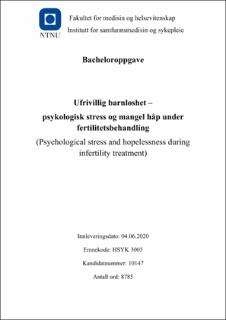| dc.contributor.advisor | Hansen, Inger Lise | |
| dc.contributor.author | Moen, Silje Skorstad | |
| dc.date.accessioned | 2020-07-17T16:02:45Z | |
| dc.date.available | 2020-07-17T16:02:45Z | |
| dc.date.issued | 2020 | |
| dc.identifier.uri | https://hdl.handle.net/11250/2669563 | |
| dc.description.abstract | Tittel: Ufrivillig barnløshet – psykologisk stress og mangel på håp under fertilitetsbehandling
Problemstilling: Hvordan kan sykepleier bidra til å redusere psykologisk stress og fremme håp til ufrivillig barnløse under fertilitetsbehandling?
Metode: Litteraturstudie. 8 vitenskapelige forskningsartikler er inkludert i studien, ved bruk av systematiske, strukturerte søk i vitenskapelige databaser, supplert med relevant pensumlitteratur og faglitteratur, samt en ressurssamtale.
Resultat: Ufrivillig barnløse under fertilitetsbehandling er utsatt for kontinuerlig psykologisk stress. Gjennom behandlingen opplever pasientene å dras mellom håp og forventninger på den ene siden, og angst, usikkerhet, skuffelse og sorg på den andre siden. Det psykologiske stresset er en trussel mot pasientenes velvære, og gjør de særlig utsatt for psykiske lidelser. Tap av håp identifiseres som den tyngste av psykologiske belastninger blant infertilitetspasienter, som også forverrer andre psykologiske belastninger. Opplevelse av håp er dermed en viktig ressurs for å mestre infertilitetsbehandling. Sykepleieren på fertilitetsklinikken kan spille en viktig rolle. For å utøve sykepleie som reduserer psykologisk stress og fremmer håp, må sykepleieren ha en helhetlig, pasientsentrert tilnærming til pasienten. Sykepleieren må forsøke å etablere en menneske-til-menneske-relasjon preget av empati og forståelse. Sykepleien på klinikken må systematiseres og organiseres på en slik måte at pasientenes opplevelse av situasjonen, behov for sykepleie og behov for supplerende helsetjenester rutinemessig og kontinuerlig, gjennom og etter behandlingsprosessen, blir identifisert.
Konklusjon: Litteraturstudien viser at sykepleier kan spille en viktig rolle i å redusere psykologisk stress og fremme håp hos fertilitetspasienter. For å gjøre det må sykepleieren identifisere pasientens forståelse av situasjonen og kartlegge pasientens behov. For å kunne møte disse behovene må sykepleien på fertilitetsklinikkene organiseres slik at en helhetlig og pasientsentrert tilnærming blir implementert i de daglige rutinene på klinikken. Det må sikres at pasienten får en god oppfølging gjennom hele behandlingsforløpet og etter avsluttet behandling. Det er behov for ytterlige forskning på fertilitetspasienter i Norge, for et større kunnskapsgrunnlag knyttet til behov for psykologisk støtte, informasjon og oppfølging og hvordan disse behovene blir møtt i de norske fertilitetsklinikkene.
Nøkkelord: Ufrivillig barnløshet, fertilitet, infertilitet, fertilitetsbehandling, assistert befruktning, IVF, stress, psykologisk stress, håp, mestring, sykepleie, fertilitetssykepleie. | |
| dc.description.abstract | Summary
Title: Psychological stress and hopelessness during infertility treatment
Question of topic: In what ways can nurses contribute to reducing psychological stress and promote hope for infertility patients during infertility treatment?
Method: Systematic review. 8 scientific research articles included, with systematic, structured literary searches from scientific databanks, supplied with relevant curriculum and literature, and a resource interview.
Result: Infertility patients during infertility treatment are exposed to continuous psychological stress. Throughout the process of treatment, they are pulled between feeling hopeful and excited, to anxious, uncertain, disappointed and depressed. The psychological costs can be a threat to the patients` wellbeing and leave them vulnerable to mental illness. Lack of hope is identified as one of the heaviest psychological costs among infertility patients, which can also worsen other psychological burdens. That makes hope a valuable resource to coping with infertility treatment. The nurse at the fertility clinic may play a key role. To perform nursing care that reduces psychological stress and promotes hope, the nurse should obtain a patient focused and comprehensive care. The nurse should thrive to establish a human-to-human-relationship based on empathy and understanding. The care should be organized and systemized in a way that assures that the patients` understanding of the situation and needs for care and further health services are identified.
Conclusion: This review identifies the nurse as a key role in contributing to reducing psychological stress and promoting hope for patients treated for infertility. To be able to do so, the nurse should be aware of the patients` own understanding and meaning of the situation, to identify their needs for psychological support, care, information and further health care. To meet the patients’ needs, the care at the fertility clinics should be organized with a comprehensive and patient centred approach implemented in their routines. The patients should receive human care through the process of treatment and after failed or discontinued treatment. More research regarding infertility treatment in Norway is needed, to achieve more knowledge of how the needs of infertility patients are met in both public and private Norwegian infertility clinics.
Key words: Fertility, infertility, infertility treatment, ART, IVF, stress, psychological stress, psychological costs, hope, coping, nurse, nursing care. | |
| dc.publisher | NTNU | |
| dc.title | Ufrivillig barnløshet - psykologisk stress og mangel på håp under fertilitetsbehandling | |
| dc.type | Bachelor thesis | |
